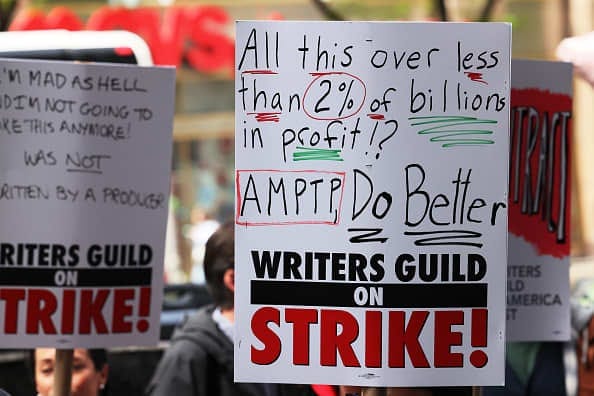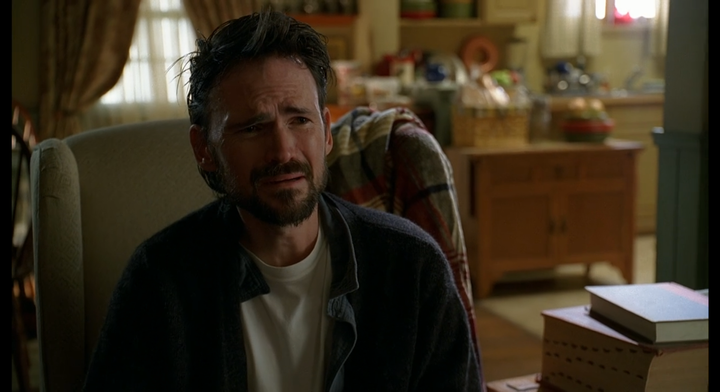Paying The Writer
Appreciating the writers who matter to you, and why you should.

Every Saturday I wake up and I think “I get to write the newsletter now.” It’s a great way to wake up. And then I brew coffee, and go down to my office, and I write the newsletter, and it takes a few hours when it goes easily, and it takes almost all day when it goes hard, but either way I do it, and I enjoy it a lot, even when it’s difficult.
It’s a great feeling—and it’s entirely because of all of you reading this. What a writer wants most is a readership—a human connection—and that’s what you’ve given me. I had this idea that I could write something people would enjoy, and then you all proved my weird notion right. If you hadn’t arrived, I doubt I’d still be doing it. But you did arrive, so I am doing it, and I really appreciate that.
It’s tougher being a creative person than it used to be, I think.
For example, we’ve got another strike going, because story distributors really like making all the money that comes with distributing stories that everyone loves, which they do not create, yet they’d rather not pay even a little bit of that money to the people who actually create the stories they distribute, if they can help it. So they’re hoping to get story machines to generate the stories instead, and until they can do that, they’ve chosen to make it very hard to make a living if what you do is create the stories that everyone loves.
These people who create stories are known as “writers,” by the way. The stories are crafted with your enjoyment in mind, and they are the things that you love so much. Every last one of them started as an idea in the mind of a writer, which that writer brought out of their mind and put down into words, using a craft that they have spent their lives developing and honing.
The people who distribute these stories do not make the stories that you love. They make the streaming platforms, which are the things you mostly complain about. Streaming platforms are not crafted with your enjoyment in mind; they are designed with profit in mind. “Profit” is a word that means “how do we get as much of the money as possible and keep as much of it as possible?” Often the answer is “by creating our delivery systems to cost us as little as possible while maximizing the money it brings in, even if this makes the experience of being on the platform worse” and this is why you complain about streaming platforms, even as they are delivering you something you love, which, again, are stories.
But here’s the interesting thing: the people who make the thing that you complain about also get to make all the decisions about how much of your money goes to the people who make the thing you love. And you’ll never guess what, but their decision is “not even enough to live off of, and soon hopefully none at all.”
That’s what the story machines are for, incidentally. The distributors of stories would like to make even the creation of stories something that is nothing but a delivery system, crafted not primarily with you in mind, but profit.
So there’s a strike, because the people who are driven by profit have learned to view any cost (which hurts profit) as a problem, and so there is a growing and detectable contempt for creators, and their desire to make things primarily for people rather than profit, and their request to be paid table scraps by distributors for generating all the value that gets distributed.
I’m not a screenwriter, but I am a writer, so I’ve been watching with interest this growing contempt for human creativity; this idea that the act of creation is a formula and the people who create are not the source of value but a cost; this growing desire to do away with the people who do the thing that makes so much value for all of us, in order to further enrich the already monumentally wealthy people who essentially only deliver a value that they neither appreciate nor understand.
It’s a tough thing, being a writer and relying on distributors. Example: I used to write on Twitter’s newsletter publisher, Revue, but then Twitter got a new owner whose name I can’t remember right now, and he basically burned everything to the ground. So now I write on Substack, which is far more stable and much better at connecting writers to interested readers, and pretty good (at least for now) at taking only a reasonable cut for the real delivery service they provide … but I have no illusions that I don’t also rely on the whims of Substack’s owners, or whoever might someday decide to buy Substack. And Twitter’s new owner throttled links from Substack, which is a problem for me, because Twitter is where my largest audience resides, even though it has never helped me see a dime of whatever value I have created for it.
Anyway, it’s in the air, this open contempt for art and human creation and therefore humanity in general; this instinct to treat humans not as the reason for our society but a cost better done away with.
It’s made me want to find writers I appreciate and pay them.
So that’s what I’ve done.
Every 3 months I post something suggesting you upgrade your subscription to this newsletter from free to paid.
This is that post.
However, I’m going to do it a bit differently this time.
I think that if (and only if) you are able to pay a writer or two that you appreciate, you should do that. To be clear, I do hope that the person you appreciate in this way might be me. But if not, I understand. For you, I might be just OK; good enough to show up in your in-tray (or spam filter) once a week, but not exactly “let’s-pay-this-person” good.
That’s all fair enough. But I bet there is somebody. I bet there are one or three or five writers who deliver something that gives you joy, or hope, or comfort, or a sense that you’re not alone.
Think of those people. They’re out there. If you can (and only if you can), I think you ought to give them something, even if it’s only a little; a couple bucks a month; $10 a year, whatever.
I think it’s important in ways that go beyond money. It’s about countering this open contempt for human creativity that’s floating around. It sends a message to a writer that they’re valued. It helps them wake up in the morning and think “I get to write today.”
Again, if you really can’t pay, don’t. Please don’t. I have a pay-what-you-want model, precisely because I know some people truly don’t have the money to pay even a buck a month for a newsletter, and not having money creates enough obstacles in life without my adding to it. Everyone gets the same newsletter.
But I do think this newsletter has value. I’ll give you just a few examples of the things I’ve written since the last time I shook the old tip jar.
- I wrote about our merchants of genocide, and the professional skeptics who pave their way; about the way they are targeting trans people right now, and how we can tell by watching the recipes they follow that they know exactly what they’re doing.
- I wrote about the smartest man in the world, and Beavis and Butthead, and Twitter, and all the ways sabotaging value has been made more profitable than creating it.
- And I wrote about Jimi Hendrix, and the parents who think they own their children, and your children, and everything else too; about being the real deal, and about the vast expanse between owning something and having it.
- I wrote about how Jordan Neely was a person, and about the dominant cultural mentality that is offended at the very notion of his humanity, and what living in a nation of fear means for all of us.
- And of course, for my LOSTies, I am putting out regular high-quality LOST content (or at least I’m putting out a lot of it).
Maybe one of these essays I listed spoke to you, or brought you some connection, some joy, or hope, or comfort. I hope so.
Or maybe there’s some other writer you’re thinking about, whose words brought you connection or joy, or hope, or comfort.
I’d love to hear about who those writers are, in the comments. Let us find the writers you appreciate, too. I’ll join you there, and let you know who I’ve been paying.
If I’m one you’d like to pay, keep reading for instructions how.
OK enough jibberjaw: here’s how you pay.
Click here to pay $1/month or $10/year
Click here to pay $2/month or $20/year
Click here to pay $3/month or $30/year
Click here to pay $4/month or $40/year
Click here to pay $5/month or $50/year
Click here to pay $6/month or $60/year
Click here to pay $7/month or $70/year
Click here to pay $8/month or $80/year
Click here to pay $9/month or $90/year
Click here to pay $10/month or $100/year
There’s a Founding Member option, which allows you to pay as much as you want as an annual amount. I’m suggesting a floor of $150/year for this level, and it will come with a personalized autographed copy of my novel, The Revisionaries, along with a personalized autographed copy of any other book I publish during a year in which you are subscribed at this level.
If you choose to pay, thank you!
Either way, I'm going to go on writing these newsletters for as long as I want, and you're going to keep getting them for as long as you want. And if I stop, I presume you'd stop paying.
And that's that.
-Mox




Comments ()